
Funaria is a genus of approximately 210 species of moss. Funaria hygrometrica is the most common species. Funaria hygrometrica is called “cord moss” because of the twisted seta which is very hygroscopic and untwists when moist. The name is derived from the Latin word “funis”, meaning "a rope". In funaria root like structures called rhizoids are present.
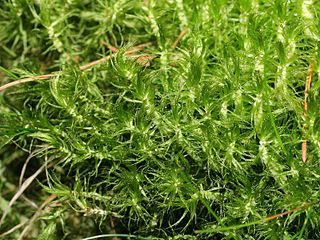
Dicranum is a genus of mosses, also called wind-blown mosses or fork mosses. These mosses form in densely packed clumps. Stems may fork, but do not branch. In general, upright stems will be single but packed together. Dicranum is distributed globally. In North America these are commonly found in Jack pine or Red pine stands.

Calypogeia is a genus of liverworts in the family Calypogeiaceae.

Hypnaceae is a large family of moss with broad worldwide occurrence in the class Bryopsida, subclass Bryidae and order Hypnales. Genera include Hypnum, Phyllodon, and Taxiphyllum.
Gyalectidium is a genus of lichen-forming fungi in the family Gomphillaceae. A 2020 estimates placed 52 species in the genus. The genus was circumscribed by Swiss lichenologist Johannes Müller Argoviensis in 1881. He included 3 species: G. xantholeucum, G. dispersum, and G. filicinum; the last of these is now the type species of the genus.

Tayloria is a genus of mosses in the family Splachnaceae. It comprises 45 species, divided among 6 subgenera:

Schistidium is a plant genus in the moss family Grimmiaceae.
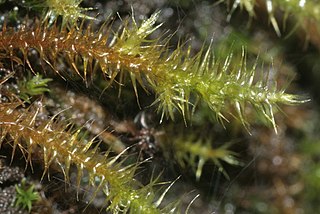
Amblystegiaceae is a family of mosses. It includes 20 to 30 genera with a total of up to 150 species. They occur nearly worldwide, growing in tropical, temperate, and subpolar regions.
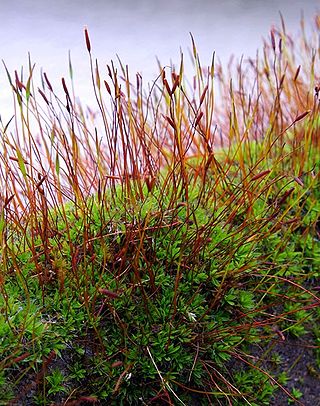
Tortula is a genus of mosses in the family Pottiaceae.
Elisabetta Fiorini Mazzanti, was an Italian botanist and writer. She was known for her work in bryology and algae. In scientific literature, she is referred to by the abbreviation Fior.-Mazz.

Thuidium is a genus of moss in the family Thuidiaceae. The name comes from the genus Thuja and the Latin suffix -idium, meaning diminutive. This is due to its resemblance to small cedar trees.
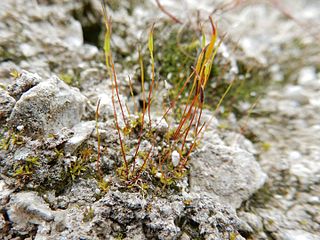
Aloina is a genus of mosses belonging to the family Pottiaceae first described by Nils Conrad Kindberg. It has a cosmopolitan distribution.

Plagiothecium is a genus of moss belonging to the family Plagiotheciaceae. It has a cosmopolitan distribution.

Rhynchostegium is a genus of pleurocarpous mosses belonging to the family Brachytheciaceae. The genus has a cosmopolitan distribution across different climatological regions except the polar regions, mostly in tropic to north temperate regions. The genus contains both aquatic and terrestrial species. The genus was named for their rostrate opercula. The type species of this genus is Rhynchostegium confertum (Dicks.) Schimp.

Tortella is a genus of mosses belonging to the family Pottiaceae. The genus was first described by Karl Müller and has a cosmopolitan distribution
Campylium is a genus of mosses belonging to the family Amblystegiaceae.
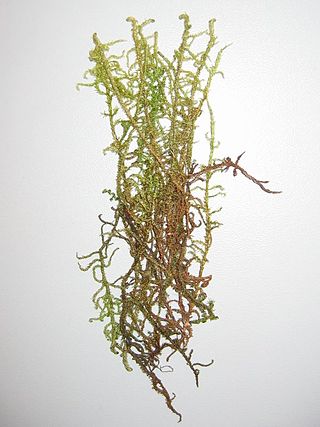
Drepanocladus is a genus of mosses belonging to the family Amblystegiaceae. It has a cosmopolitan distribution
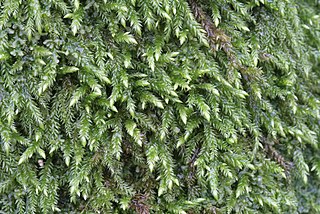
Isothecium is a genus of mosses belonging to the family Lembophyllaceae. The genus has a cosmopolitan distribution.
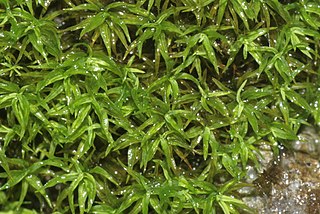
Trichostomum is a genus of mosses belonging to the family Pottiaceae.
















